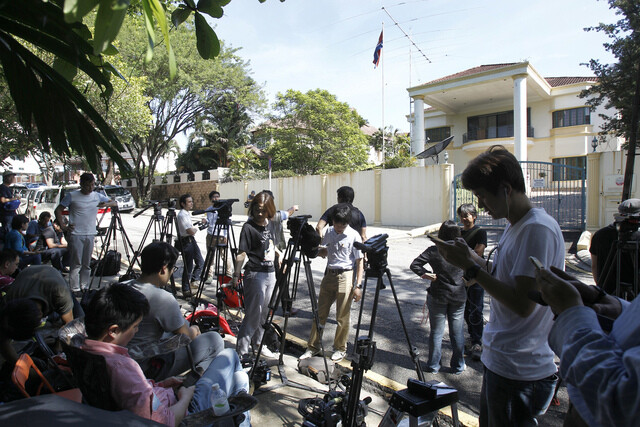hankyoreh
Links to other country sites 다른 나라 사이트 링크
Use of VX nerve agent in Kim Jong-nam killing further hardens US stance on North Korea

Following the news that the VX nerve agent was used to kill Kim Jong-nam, 46, half brother of North Korean leader Kim Jong-un, attitudes toward North Korea are hardening.Efforts to ease tensions on the Korean Peninsula, which had been tentatively advancing under new US President Donald Trump, are back at square one. This is likely to damage North Korea’s relations not only with the US but also with China and to interrupt behind-the-scenes efforts by the US and China to resolve the North Korean nuclear issue. It will likely take quite some time to regain momentum in these areas.
In terms of North Korea’s relations with the US, since the beginning of the Trump administration there had been a tentative but noticeable effort by the US government officials responsible for North Korean policy to take advantage of the possibilities inherent during a handover of power to improve relations with North Korea. Some signs of this were several visits to North Korea by organizations that provide humanitarian aid to North Korea (such visits require the implicit approval of the US State Department) and the efforts to hold a “1.5 track” meeting between North Korean officials and American experts on North Korea in New York in early March.
These efforts continued, with uncertainty, even after North Korea‘s launch of a ballistic missile and the killing of Kim Jong-nam. An article by the New York Times on Feb. 25 concluded that these developments had apparently not thwarted State Department plans to proceed with negotiations with North Korea. This is reflected by the fact that the State Department announced as late as the morning of Feb. 24 that it would approve the 1.5 track organizers’ request for visas for North Korean officials. But there was a sudden reversal that same afternoon when the visa issuance was rescinded. The biggest factor, according to the US media, was the revelation that Kim Jong-nam had been killed by the VX nerve agent - which, as a weapon of mass destruction, is anathema to the US.

The reversal of the State Department’s agreement to issue the visa can be understood as a political decision by the White House or by senior officials in the State Department. Since this also suggests that lower-level officials will have considerably less room to work in the future, it could not only worsen the US administration’s attitude toward North Korea but also function as a major obstacle in future attempts to improve relations with the North.
The fact that the US government has started considering whether to designate North Korea once again as a state sponsor of terrorism illustrates how its stance toward North Korean policy is shifting. But political will is not the only consideration for such a designation: there must be repeated terrorist activities within a six-month period, and there is the thorny legal question of whether it counts as terrorism when a state kills its own citizens.
The Chinese government has adopted a cautious stance about the VX nerve agent. But given the growing conflict and tension between North Korea and China over China‘s decision to block imports of North Korean coal, the VX issue is likely to further obscure the outlook on their bilateral relations. The New York Times even suggested that the use of VX could bring North Korea and China’s relations to their worst point since World War II.
While the US and China had been working quietly on a solution to the North Korean nuclear issue, there is unlikely to be a major push in this area. During a phone call on Feb. 21, US Secretary of State Rex Tillerson and Chinese State Councilor Yang Jiechi reportedly agreed on the need for a solution to the North Korean nuclear issue.
By Yi Yong-in and Kim Oi-hyun, Washington and Beijing correspondents
Please direct questions or comments to [english@hani.co.kr]

Editorial・opinion
![[Column] Has Korea, too, crossed the Rubicon on China? [Column] Has Korea, too, crossed the Rubicon on China?](https://flexible.img.hani.co.kr/flexible/normal/500/300/imgdb/original/2024/0419/9317135153409185.jpg) [Column] Has Korea, too, crossed the Rubicon on China?
[Column] Has Korea, too, crossed the Rubicon on China?![[Correspondent’s column] In Japan’s alliance with US, echoes of its past alliances with UK [Correspondent’s column] In Japan’s alliance with US, echoes of its past alliances with UK](https://flexible.img.hani.co.kr/flexible/normal/500/300/imgdb/original/2024/0419/2317135166563519.jpg) [Correspondent’s column] In Japan’s alliance with US, echoes of its past alliances with UK
[Correspondent’s column] In Japan’s alliance with US, echoes of its past alliances with UK- [Editorial] Does Yoon think the Korean public is wrong?
- [Editorial] As it bolsters its alliance with US, Japan must be accountable for past
- [Guest essay] Amending the Constitution is Yoon’s key to leaving office in public’s good graces
- [Editorial] 10 years on, lessons of Sewol tragedy must never be forgotten
- [Column] A death blow to Korea’s prosecutor politics
- [Correspondent’s column] The US and the end of Japanese pacifism
- [Guest essay] How Korea turned its trainee doctors into monsters
- [Guest essay] As someone who helped forge Seoul-Moscow ties, their status today troubles me
Most viewed articles
- 1[Column] The clock is ticking for Korea’s first lady
- 2Hong Se-hwa, voice for tolerance whose memoir of exile touched a chord, dies at 76
- 3After 2 months of delayed, denied medical care, Koreans worry worst may be yet to come
- 4[Column] Has Korea, too, crossed the Rubicon on China?
- 5US overtakes China as Korea’s top export market, prompting trade sanction jitters
- 6Samsung barricades office as unionized workers strike for better conditions
- 7All eyes on Xiaomi after it pulls off EV that Apple couldn’t
- 8[Correspondent’s column] In Japan’s alliance with US, echoes of its past alliances with UK
- 975% of younger S. Koreans want to leave country
- 10[Correspondent’s column] The US and the end of Japanese pacifism